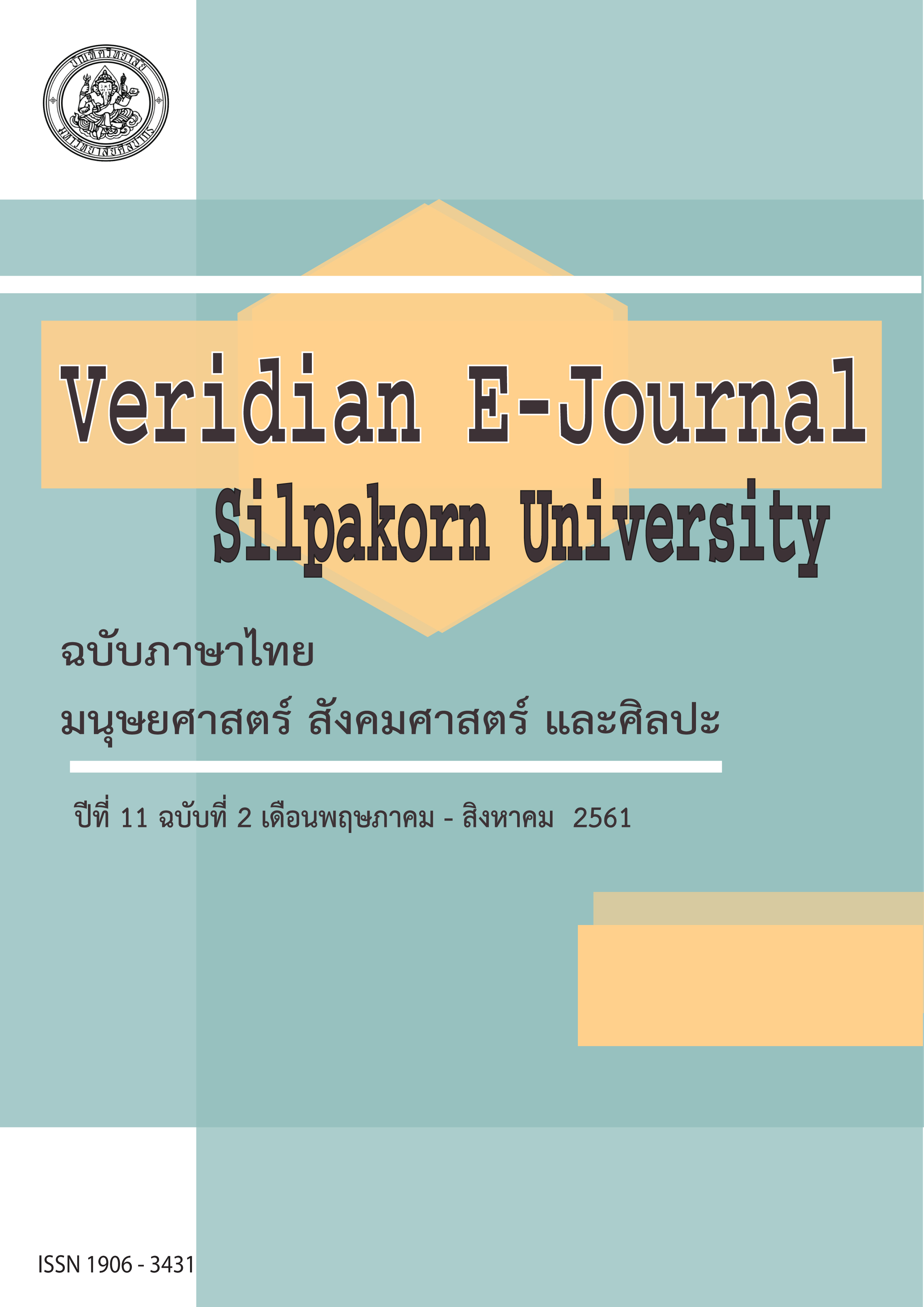รูปแบบการประยุกต์ใช้ปรัชญาของเศรษฐกิจพอเพียงและความเชื่อมโยงกับเศรษฐกิจชุมชนที่มีผลต่อความสำเร็จในการบริหารจัดการสถาบันการเงินชุมชน (Model of applying sufficient economy philosophy and linkage with community economy affecting the successful of community finance institute management)
Main Article Content
Abstract
การวิจัยนี้มีวัตถุประสงค์เพื่อศึกษารูปแบบการประยุกต์ใช้ปรัชญาของเศรษฐกิจพอเพียง และความเชื่อมโยงกับเศรษฐกิจชุมชนที่มีผลต่อความสำเร็จในการบริหารจัดการสถาบันการเงินชุมชน ตัวอย่างเป็นประธานกองทุนหมู่บ้าน และสถาบันการเงินชุมชนในสังกัดสำนักงานกองทุนหมู่บ้านและชุมชนเมืองแห่งชาติสาขา 12 รวม 400 คน ผู้ให้ข้อมูลหลักเป็นประธาน คณะกรรมการ และสมาชิกของสถาบันการเงินชุมชนต้นแบบอ้อมใหญ่ หมู่ 8 จังหวัดนครปฐม และสถาบันการเงินชุมชนบ้านวัดพระศรีอารย์ จังหวัดราชบุรี และเจ้าหน้าที่จากสำนักงานกองทุนหมู่บ้านและชุมชนเมือง เขต 12 รวม 20 คน เครื่องมือที่ใช้ในการวิจัย ประกอบด้วย แบบสอบถาม แนวคำถามการสัมภาษณ์ระดับลึก และแนวทางการสนทนากลุ่ม การวิเคราะห์ข้อมูลเชิงปริมาณ ประกอบด้วย ค่าความถี่ ค่าร้อยละ ค่าเฉลี่ย ค่าส่วนเบี่ยงเบนมาตรฐาน และการวิเคราะห์แบบจำลองสมการโครงสร้าง และการวิเคราะห์เชิงคุณภาพใช้การสร้างทฤษฎีฐานราก
ผลการศึกษา พบว่า 1. ปัจจัยด้านผู้นำ ปัจจัยด้านคณะกรรมการ ปัจจัยด้านสมาชิก ปัจจัยด้านการเรียนรู้และปัจจัยด้านเครือข่ายส่งผลต่อการประยุกต์ใช้ปรัชญาของเศรษฐกิจพอเพียง และความเชื่อมโยงกับเศรษฐกิจชุมชนอย่างมีนัยสำคัญทางสถิติ และได้ค่า R2 = 54.4 2. สถาบันการเงินชุมชนประยุกต์ใช้ปรัชญาของเศรษฐกิจพอเพียงในด้านการออม ด้านการให้สินเชื่อ ด้านการจัดการการเงิน ด้านสวัสดิการชุมชน และด้านการบริหารจัดการ และมีความเชื่อมโยงระหว่างสถาบันการเงินชุมชนกับเศรษฐกิจชุมชน ด้านการส่งเสริมการออมให้แก่คนในชุมชน การส่งเสริมการพึ่งพาตนเอง การส่งเสริมการประกอบอาชีพ การส่งเสริมสวัสดิการชุมชน และการส่งเสริมกิจกรรมของชุมชน 3. แนวทางการประยุกต์ใช้ปรัชญาของเศรษฐกิจพอเพียงในการบริหารจัดการสถาบันการเงินชุมชน ประกอบด้วย 3.1 การใช้หลักความพอประมาณและการมีภูมิคุ้มกันในตัวที่ดีในการกำหนดนโยบายส่งเสริมสถาบันการเงินชุมชน 3.2 การใช้ความรู้และคุณธรรมในการตัดสินใจในการบริหารจัดการเพื่อสร้างความเชื่อมั่นและความมั่นคงให้แก่สถาบันการเงินชุมชน 3.3 การใช้ความรู้และคุณธรรมส่งเสริมการแลกเปลี่ยนเรียนรู้ของสมาชิกเพื่อพัฒนาคน พัฒนาชุมชน และเชื่อมโยงกับเศรษฐกิจชุมชน
This research investigated proposed a development model for application of the relations between philosophy of sufficiency economy and community economy linkage affecting success in management of community financial institutions. Both quantitative and qualitative research methods were used for gathering data. 400 participants in this investigation were the chairs and members of village fund and community finance institutes under National Village and Urban Community Fund Office12th branch. The major informants were the chair and members from community financial institute of Baan Om Yai Moo 8, Nakhon Pathom province, community financial institute of Prasri-arn, Ratchaburi province, and 30 administrators from national village and urban community fund office 12th branch. Data collection was gathered from questionnaires, in-depth interviews and focus groups. The process of data analysis in quantitative research included descriptive statistics, structural equation model (SEM) and in quantitative research was grounded theory construction methods.
The findings indicated that : 1. factors of leader, committee, member, learning, and network affected the application in philosophy of sufficiency economy and community economy linkages with statistical significance and R2 = 55.4. 2. Community finance institutes applied the philosophy of sufficiency economy in savings, credits, financial management, and community welfare and management. The result also revealed the linkages between the community financial institutes and community economy in promoting saving, self-reliant, careers, welfare, and community activities for community people. 3. The guidelines for application of the philosophy of sufficiency economy in managing community financial institutions consisted of 3.1 The use of moderation and self-immunity in determining policies promotes community financial institutions. 3.2 The use of knowledge and prudence manages the building confident and stability of community financial institutions. 3.3 The use of knowledge and prudence promotes the learning exchange among members for human and community development and economy community linkages.
